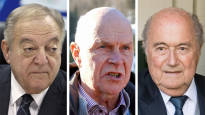– This looks like a stab in the back of clean athletes.
CEO of USADA, the US anti-doping agency Travis Tygart didn’t hold a candle under the bushel when The New York Times asked him on Friday for a comment on the Chinese swimmers’ rally.
NYT and German ARDAccording to , 23 Chinese swimmers were allowed to compete in the 2021 Tokyo Olympics, even though the swimmers had tested positive for the banned trimetazidine in the Chinese national games seven months earlier.
The matter was not disclosed to the public. The World Anti-Doping Agency Wada believed the Chinese authorities’ explanation that trimetazidine had ended up in the bodies of swimmers staying at the same hotel unintentionally from spoiled food in the kitchen.
Not everyone swallowed the Chinese report. According to NYT, the FBI is now investigating Wada’s activities.
Wada is the focus of special attention this year due to the Paris Olympics in July-August. In November, Wada will celebrate its 25th birthday.
Travis Tygart has been an active critic of Wada in recent years, although according to him, the anti-doping agency has achieved a lot of good.
– Wada’s initial efforts were full of success. A global coalition was born that formed common rules, received funding for work on behalf of clean sports and gave a voice to clean athletes. Wada’s leadership at the time was impressive. Unfortunately, the same cannot be said about the development of recent years, Tygart told Urheilu in February at the international Play The Game conference.
Wada became politicized
Tygart, who became head of Usada in 2007, is a lawyer by profession. He is best known as a cyclist Lance Armstrong’s and runner by Marion Jones about exposing doping tapes, even though neither superstar gave a positive doping sample in their career.
According to Tygart, in the early 2000s, sports took significant steps away from the old model, where sports organizations played a dual role. By this, Tygart means a situation where the same entity handled both the marketing of the sport and the monitoring of ethical issues such as doping.
However, according to Tygart, the development stopped in the last decade. He considers the year 2014 to be a significant turning point, when Scotch From Craig Reedie became Wada’s chairman. Reedie came to the position from the position of Vice President of the International Olympic Committee IOC.
– This was one of the things with which sports organizations tried to restore their dominant position in Wada, Tygart said.
According to Tygart, the influence of sports leaders was especially visible after the Russian state-run doping program was revealed. With this, he refers to the 2016 doping scandal, due to which Russia has not been a full member of WADA for eight years. Russia’s anti-doping agency was also suspended because it was involved in cheating.
Despite this, the vast majority of Russians under the scope of national anti-doping activities were allowed to continue competing as so-called neutral status athletes.
– Wada must take responsibility for allowing Russians outside the anti-doping agreement to enter major international competitions, Tygart said.
Shameful information revealed
The cart has also visited Wada’s own head.
In recent years, it was revealed that the Norwegian president of the International Biathlon Union Anders Besseberg had taken watches, prostitutes’ services and hunting trips to Russia, Austria and the Czech Republic as bribes. He had also covered up the suspicious test results of the Russian biathletes.
Besseberg was part of Wada’s highest decision-making body, the Wada Foundation Board, from the beginning of the 2000s until 2018. In April, a Norwegian court sentenced Besseberg to three years and one month in prison.
Former President of the International Weightlifting Federation Tamas Ajan was banned for life for taking bribes in 2022. The former president of the International Football Association Sepp Blatter’s the bribe will expire in the light of current information in 2028. Like Besseberg, Ajan and Blatter served on the Wada Foundation Board.
– When these people have been in Wada’s decision-making bodies, it does not send a message to clean athletes that they are cared for, Tygart said.
External supervision a necessity
The symbiosis of sports decision-makers and Wada has been strong since the beginning. Half of Wada’s annual budget of around 50 million euros comes from the IOC and the other half from the states.
As of 2022, the Wada Foundation Board has had 42 members. Ten of them are from the IOC. The other ten members represent various Olympic movements such as national Olympic committees. 20 other two-year positions are distributed to the sports ministers of different continents.
The remaining two seats at the decision-makers’ table belong to Wada’s Polish chairman to Witold Banka and to the Chinese Vice President Yang to Yang.
Tygart would convert Wada’s decision-making body to a whole new faith. Conflicts of interest should be eliminated.
– Whether it was about Lance Armstrong, the Balco scandal (the doping scandal of a US laboratory), major sports leagues or the International Association of Athletics Federations before Sebastian Coetathe goal of sports operators has always been to keep the best athletes in the competition by any means.
– History has taught that it is impossible to do two jobs at the same time. Sports decision-makers must focus on collecting money and sponsors and filling the stands. If the sponsor has invested tens of millions of dollars in the athlete, a positive doping case is not in the interests of the sponsor or the sports decision-maker who “supervises” the sport. This happened, for example, in the case of Marion Jones, Tygart said.
Tygart would also show the door to politicians and make Wada a completely expert-oriented, independent organization.
– Wada’s rule book has 2600 pages. Who, who does not know the subject, can manage to get familiar with such amount of information? At least not a politician sitting for two years.
